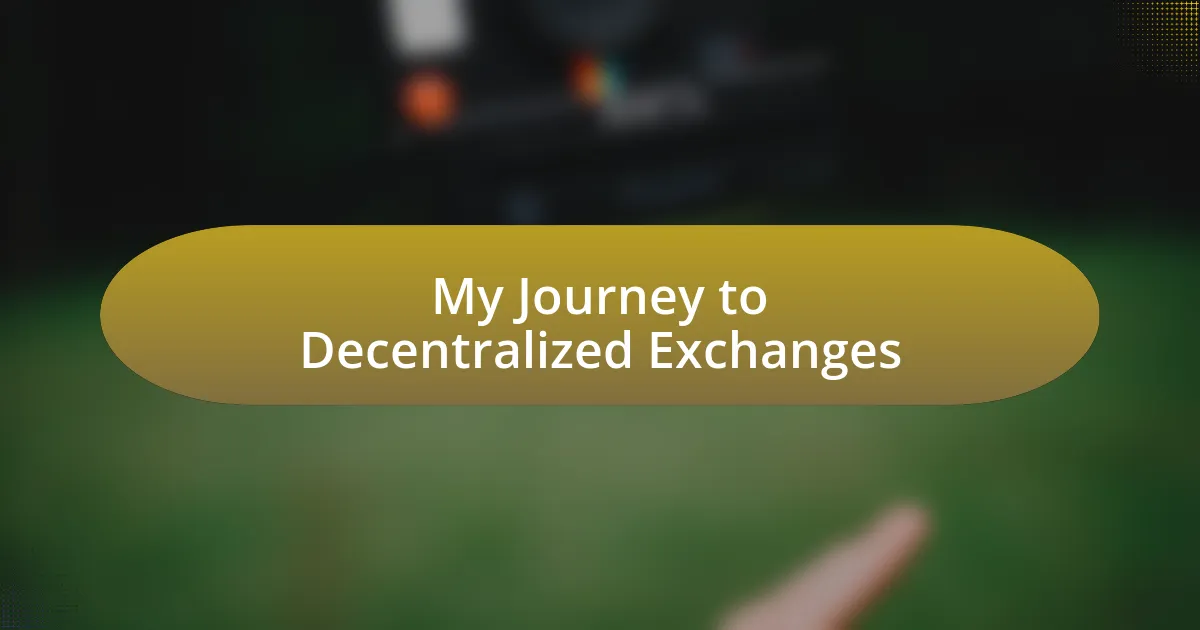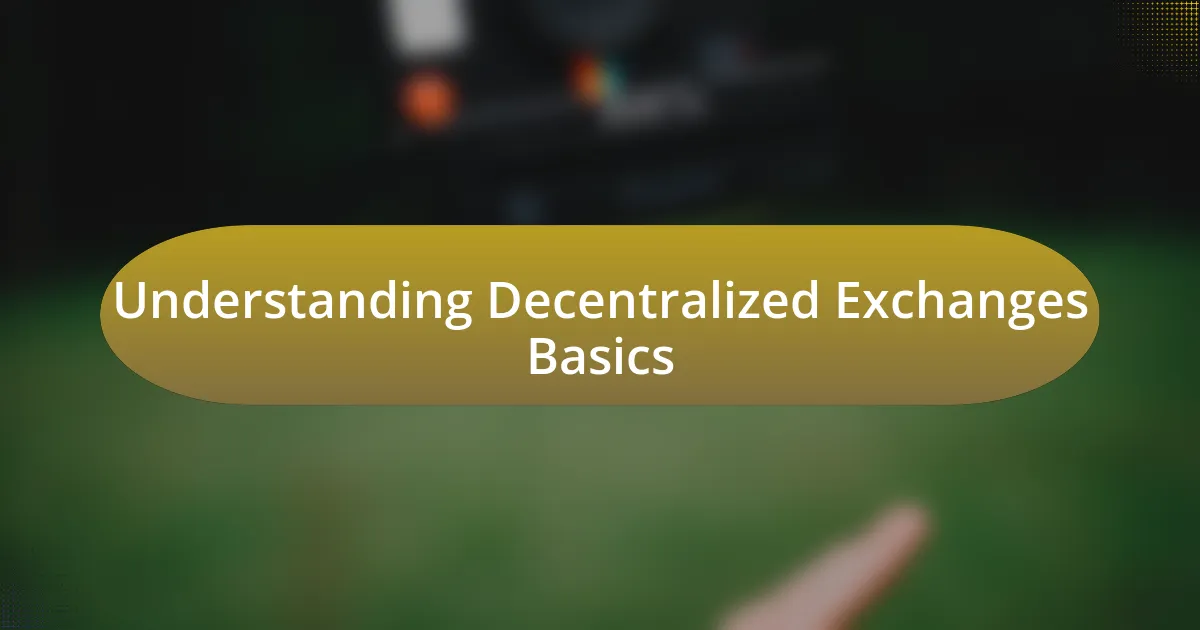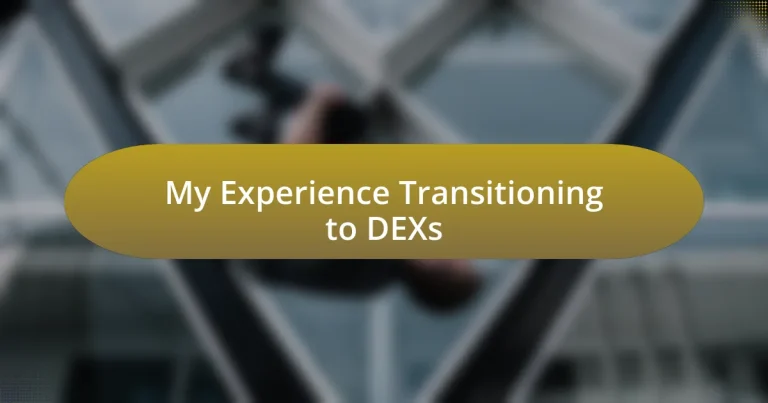Key takeaways:
- Decentralized exchanges (DEXs) empower users with direct control over funds, enhancing privacy and trading autonomy.
- Key considerations before transitioning to DEXs include assessing risk tolerance, implementing strong security measures, and familiarizing with the user interface.
- Choosing the right DEX involves evaluating liquidity, supported tokens, and community support for improved trading experiences.
- Lessons learned include the importance of patience, understanding market conditions, and leveraging community knowledge to enhance trading strategies.

My Journey to Decentralized Exchanges
My journey to decentralized exchanges (DEXs) began with a curiosity about the future of finance. I remember the moment vividly when I first heard about Uniswap—it felt like a glimpse into a world where anyone could trade tokens without intermediaries. Could it really be that simple and empowering?
As I began experimenting with DEXs, I found an exhilarating sense of freedom. I experienced the thrill of swapping tokens directly from my wallet, bypassing the traditional banking system. But I also faced challenges, like navigating different liquidity pools and understanding impermanent loss. It raised the question: how much risk was I willing to take for this new level of autonomy?
Over time, I grew more comfortable with the mechanics of DEXs, but the emotional rollercoaster was real. I recall a particularly nerve-wracking moment when slippage led to unexpected losses on a trade. It was a hard lesson, but it deepened my appreciation for the responsibility that comes with decentralized trading. Would I give up this freedom for the stability of a centralized exchange? Ultimately, it reinforced my belief in owning my financial decisions.

Understanding Decentralized Exchanges Basics
Understanding Decentralized Exchanges Basics
Decentralized exchanges (DEXs) operate on blockchain technology, allowing users to trade directly with one another without relying on a central authority. I remember my initial confusion when trying to wrap my head around how transactions were verified and executed. It felt foreign, yet profoundly liberating to grasp that self-custody and direct trading were at the core of this innovation.
Here are some key aspects to help understand DEXs better:
- User Control: You have complete ownership of your funds, eliminating the need to trust a third party.
- Privacy: DEXs often require minimal personal information, allowing for more anonymous trading.
- Smart Contracts: Automated processes that execute trades based on predefined conditions without human intervention.
- Liquidity Pools: Users can earn rewards by supplying assets for trading, although this comes with some risks, like impermanent loss, which I learned the hard way.
- Token Variety: A wider range of tokens is usually available compared to centralized exchanges, making it exciting to explore new options.
When I first ventured into liquidity pools, I was mesmerized by the potential for passive income. At the same time, I felt the weight of uncertainty; every decision could lead to a profit or a painful loss. As I navigated this landscape, I realized that each trade was not just a transaction but a step into a new financial paradigm. The thrill and risk kept me on my toes, making every swap a mixture of anticipation and trepidation.

Key Considerations Before Transitioning
When considering a transition to DEXs, assessing your risk tolerance is essential. I recall a moment when I was overly confident and made trades without adequate research. That experience taught me that prices on DEXs can be volatile, and I learned to approach every trade with a healthier dose of caution.
Another critical factor is security practices. DEXs present unique vulnerabilities, and I soon realized that relying solely on the platform’s security wasn’t enough. Adopting strong personal security measures, like using hardware wallets and enabling two-factor authentication, became non-negotiable for me. It made a significant difference in my peace of mind.
Lastly, understanding the user interface of a DEX compared to a centralized exchange is vital. At first, I was overwhelmed by the complexity of functions and options. However, over time, I grew fond of the customized trading experiences DEXs offer, emphasizing the need for patience and exploration during your transition.
| Consideration | Key Insights |
|---|---|
| Risk Tolerance | Be aware of market volatility. My initial confidence led to unexpected losses. |
| Security Practices | Implement strong security measures like hardware wallets. They provide peace of mind. |
| User Interface | Familiarize yourself with DEX interfaces. They can be complex but rewarding to learn. |

Choosing the Right DEX Platform
When choosing the right DEX platform, I learned firsthand the importance of evaluating the liquidity it offers. I once found myself on a platform with poor liquidity, which made executing trades frustrating and often resulted in slippage. Have you ever felt that rush of anticipation when trying to make a trade, only to be met with a delayed execution? It can be deflating.
Another consideration is the specific tokens supported by the DEX. Initially, I was drawn to a platform because of its user-friendly interface, but I quickly discovered that it didn’t support the tokens I was most interested in. This experience taught me that a beautiful interface means little if you can’t access the assets you want. So, before you dive in, take a moment to explore the token offerings.
Lastly, I’ve found that community support plays a pivotal role in my overall experience with DEXs. I remember joining forums and groups dedicated to a particular DEX, and the wealth of shared knowledge transformed my trading practices. It made me realize that you’re not alone in this journey. Have you thought about how a supportive community can enhance your DEX experience? It’s a factor that should not be underestimated.

Tips for a Smooth Transition
When transitioning to a decentralized exchange (DEX), it’s crucial to start with smaller transactions. I remember the nervous excitement of my first larger trade and the regret that followed when I encountered unexpected fees. Have you ever jumped in too quickly, only to be left puzzled by the results? Taking it slow not only helps you find your footing but also gives you a chance to better understand the platform’s nuances.
Another tip I can share is to educate yourself on the risks involved. I once overlooked the importance of slippage and ended up losing more than I anticipated on a trade. Thinking back, I wish I had taken the time to learn about order types and how they work, like limit orders versus market orders. Do you know the difference? It can have a significant impact on how much you actually gain or lose during a transaction.
Finally, don’t underestimate setting up a secure wallet. I went through the hassle of losing access to my funds because I didn’t take the time to familiarize myself with wallet security. It was a tough lesson. How secure is your current setup? Ensuring that your assets are well-protected can alleviate a lot of anxiety when navigating new platforms.

Lessons Learned from My Experience
The first lesson that stands out from my experience is the importance of patience. One time, I was eager to take advantage of a price dip, but I rushed in and ended up with fewer tokens than I anticipated. It’s a humbling reminder that in the world of DEXs, acting impulsively can lead to missed opportunities. Have you ever made a hasty decision that you later regretted?
Understanding market conditions is another vital lesson I learned the hard way. There was a period when I neglected to check the overall market sentiment before making trades. I faced unexpected volatility that left me questioning my strategy. It became clear to me that staying informed isn’t just beneficial; it’s essential. How often do you take a moment to assess the broader market before diving into a trade?
Finally, I discovered the value of community support. Engaging with others who were also transitioning to DEXs helped me gain insights I would have missed on my own. I vividly recall a discussion where a fellow trader shared a tip about pooling resources that changed my trading game. It made me realize that collaboration often leads to better outcomes. Have you tapped into the knowledge of others on your journey? The lessons from shared experiences can be invaluable.

